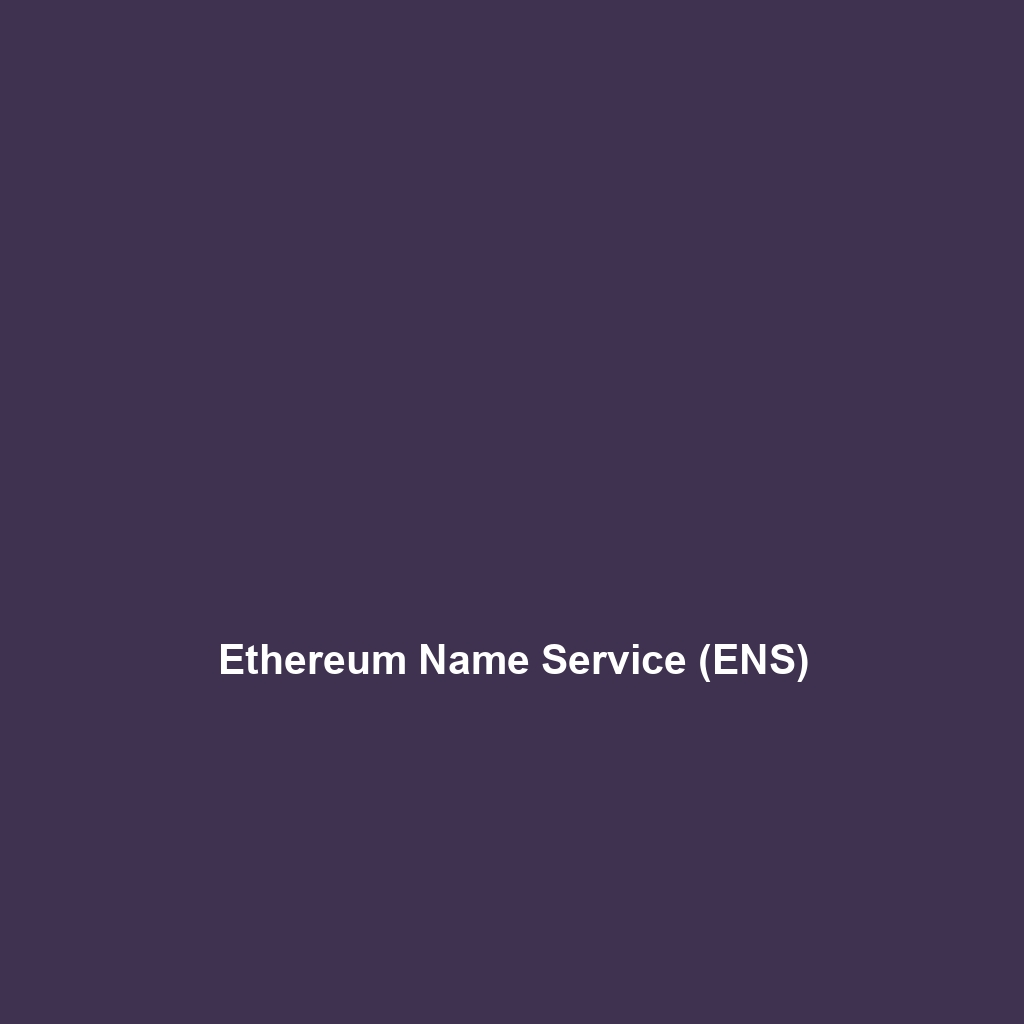Your cart is currently empty!
Tag: Ethereum Name Service

Ethereum Name Service (ENS)
Ethereum Name Service (ENS): A Comprehensive Overview
Name and Ticker Symbol: Ethereum Name Service, commonly referred to by its ticker symbol ENS, is a significant player in the cryptocurrency market.
Founders, Launch Date, and History
Ethereum Name Service (ENS) was founded by Nick Johnson and Alex Van de Sande, with its development beginning in 2017. ENS was officially launched in May 2017. Since its inception, it has reached various milestones, including the introduction of the .eth domain and the ENS governance token launch in November 2021. The project has steadily gained traction, playing a crucial role in simplifying blockchain interactions through human-readable addresses.
Blockchain Platform
ENS operates on the Ethereum blockchain, functioning as a decentralized naming system. It can be classified as a layer 1 solution, providing essential domain name services that enhance the functionality of the Ethereum network.
Purpose and Use Case
Ethereum Name Service was created to provide an efficient way to manage blockchain addresses. Its primary use cases include:
- Simplifying cryptocurrency transactions by allowing users to send crypto to an easily memorable name instead of a lengthy address.
- Decentralized identity provision for users, enabling unique digital identities across various platforms.
- Blockchain website hosting through .eth domains, facilitating the creation of decentralized applications (dApps).
Technology and Consensus Mechanism
ENS leverages the smart contract capabilities of Ethereum, employing a Proof of Stake (PoS) consensus mechanism following Ethereum’s transition from Proof of Work. This shift enhanced security and energy efficiency within the ENS ecosystem.
Supply and Tokenomics
ENS has a unique tokenomics model with a maximum supply of 100 million ENS tokens, which are used for governance and protocol development. At present, the circulating supply remains dynamic due to the staking and burn mechanisms integrated into the platform. Token holders can stake their tokens to earn rewards and participate in governance decisions about the future of ENS.
Use Cases and Adoption
ENS has found real-world applications across various sectors, including:
- Payment solutions and wallets that integrate ENS for transaction ease.
- Decentralized applications (dApps) that utilize ENS for identity management and domain services.
- Partnerships with notable DeFi projects, enhancing the user experience by using human-readable domains instead of alphanumeric addresses.
Market Performance and Metrics
As of now, ENS has achieved a market capitalization of roughly $1 billion, reflecting increasing interest and investment in the token. Historical price trends exhibit notable volatility, typical of many cryptocurrencies. Recent trading volumes average around $100 million, highlighting active engagement in crypto trading.
Where to Buy and Trade
ENS can be purchased and traded on various platforms, including centralized exchanges (CEXs) such as Coinbase, Binance, and decentralized exchanges (DEXs) like Uniswap. These platforms allow users to acquire ENS through various trading pairs.
Security and Risks
ENS prioritizes security through its decentralized architecture; however, like any cryptocurrency, it is not without vulnerabilities. Past hacks affecting similar projects underscore the importance of thorough due diligence in the crypto space. Regulatory risks remain prevalent, as governments worldwide develop frameworks for oversight in the cryptocurrency domain.
Community and Governance
ENS operates using a community-driven governance model, where ENS token holders can propose and vote on changes within the ecosystem. This model fosters community engagement, allowing users to play a direct role in shaping the platform’s future.
Competitors and Differentiation
ENS faces competition from other naming services like Handshake and Namecoin. However, ENS differentiates itself through its deep integration with the Ethereum ecosystem, widespread adoption, and advanced features that cater specifically to Ethereum users.
Roadmap and Future Developments
Looking forward, ENS has a roadmap that includes potential upgrades to enhance functionality and user experience. Ongoing partnerships with other DeFi projects aim to improve interoperability and broaden the scope of applications using ENS.
Wallet Compatibility
ENS is compatible with a variety of digital wallets including MetaMask, Ledger, and Trust Wallet, enabling users to manage their ENS assets securely and conveniently.
Regulatory and Compliance Status
ENS must navigate an evolving regulatory landscape. As regulations around cryptocurrencies tighten, ENS actively seeks compliance to mitigate legal challenges that could impede growth.
Recent News and Updates
Recently, ENS secured strategic partnerships and introduced new features enhancing user interactions on the platform. The community has been abuzz with discussions about upcoming developments that aim for broader adoption and user-friendly experiences.
Summary and Call to Action
Ethereum Name Service (ENS) is a pivotal component of the blockchain landscape. With its innovative approach to domain names and commitment to decentralization, ENS is well-positioned for future growth in the evolving cryptocurrency market. For those interested in the ongoing developments of ENS or the broader implications of such technologies, tracking ENS’s progress is worthwhile.
For additional insights, visit UpCube.net. Also, explore the cryptocurrency€„¢s official website for more information.